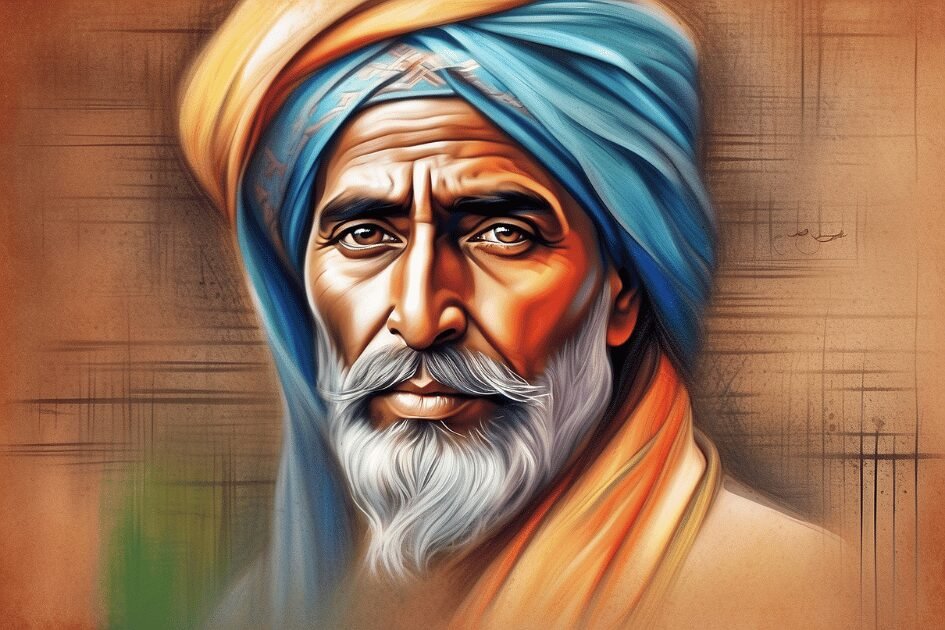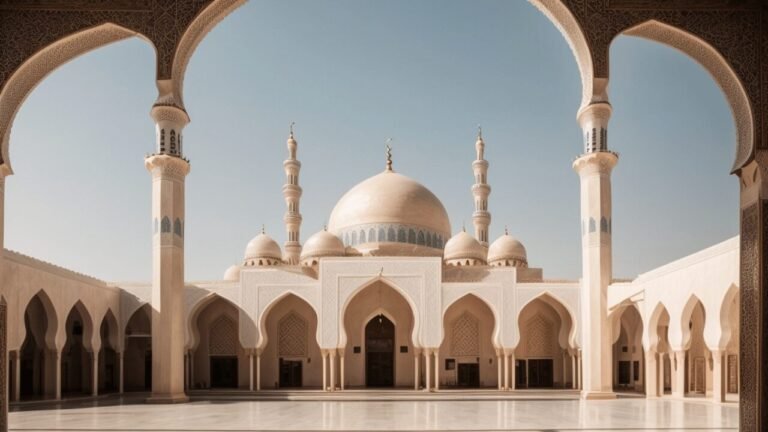In today’s fast-paced world, finding solace and grounding through faith can be a source of strength and resilience. Exploring the 6 Pillars of Iman is an excellent place to start if you want to deepen your understanding of the Islamic faith. This is the foundation of the Islamic faith, taught by Prophet Muhammad (peace be upon him). It includes belief in Allah, His angels, His Books, His Messengers, the Last Day, and divine decree, both good and bad.
By understanding and embracing these pillars, a Muslim cultivates a strong faith and unyielding devotion to worship Allah, guided by the teachings of Prophet Muhammad and the example he set for all believers.
Key Takeaways
The 6 Pillars of Iman form the foundation of a Muslim’s faith and belief system.
Islam rests on believing in Allah, His angels, His books, His messengers, the Last Day, and divine decree.
A profound understanding of these elements helps Muslims develop a solid and unwavering faith in Islam.
Living in alignment with these pillars allows Muslims to cultivate a deeply rooted and lifelong connection to worship Allah.
Following the example of Prophet Muhammad and the Quranic teachings can guide believers in creating a more purpose-driven and spiritually rich life.
Table of Contents
- The Essence of the 6 Pillars of Iman in Islam
- The Fundamental Belief in Allah: Tawheed and Its Significance
- Angelic Faith: Understanding the Role of Angels in Islam
- The Divine Scriptures: Guidance Through Allah’s Words
- Prophets of Allah: The Messengers of Divine Truth
- The Day of Judgment: Accountability in the Afterlife
- Qadar: The Concept of Divine Decree in a Muslim’s Faith
- Embracing Iman: A Fulfilling Spiritual Journey
- FAQ
The Essence of the 6 Pillars of Iman in Islam

Iman, defined as faith in Islam, embodies the belief in the six pillars that form the foundation of a Muslim’s spiritual journey. It is crucial for a well-established relationship with Allah and following the guidance of the Quran and the Sunnah. This concept of Iman is solidified by the Quranic verse 4:136 and highlighted through the teachings of Prophet Muhammad, where he explained the components of belief to his followers.
Belief in these six fundamental pillars, collectively referred to as Arkan Al-Iman, creates a system of values and principles that define the essence of Iman and shape the lives of Muslims. These six pillars of faith help shape a Muslim’s life, perceptions, choices, and interactions with the world around them. Let’s delve deeper into these pillars’ significance and influence on an Islamic lifestyle.
The Definition and Importance of Iman
Iman is the core belief system in Islam. There are six main beliefs in Islam: faith in Allah, His angels, His books, His messengers, the Day of Judgment, and the divine decree. The importance of Iman for Muslims cannot be overstated, as it is the foundation of their ultimate reality.
“O you who believe! Believe in Allah, and His Messenger, and the Scripture which He has sent to His Messenger, and the Scripture which He sent down before (him); and whosoever disbelieves in Allah, His angels, His scriptures, His messengers, and the Last Day, has indeed strayed far away.” – Quran 4:136
Iman is the driving force behind the day-to-day life of Muslim adherents, providing peace of mind, solace, dignity, and a sense of purpose. It is the key to unlocking a deeper relationship with Allah and securing His favor on earth and in the afterlife.
How the Six Pillars Shape a Muslim’s Life
Each of the six pillars of Iman shapes a Muslim’s life, worldview, and interactions with the world. Collectively, they create a comprehensive Islamic lifestyle that guides adherents through life’s challenges and experiences. Below is a brief overview of how these six pillars subtly influence various aspects of a Muslim’s life:
Prayers and Devotion: The pillars continually reinforce the importance of prayers, worship, and devotion to Allah.
Morality and Ethics: Upholding the teachings of the Quran and the Sunnah, the six pillars provide the foundation for an ethical and moral existence.
Relationships and Society: Belief in the six pillars fosters understanding, tolerance, and compassion for fellow human beings, promoting unity and cooperation within the Muslim community.
Self-Reflection: The pillars remind Muslims of the purpose of life and the ultimate goal of pleasing Allah, providing them with a framework for self-evaluation and spiritual growth.
Worldview and Belief System: The six pillars shape how Muslims perceive the world, helping them develop a mindset based on divine guidance and wisdom.
Understanding and embracing the essence of Iman is vital for Muslims aspiring to cultivate a holistic Islamic lifestyle centered around worshiping Allah and following the guidance of the Quran and the Sunnah. By embodying these fundamental beliefs, Muslims can develop a stronger connection with Allah, deepening their faith and enriching their spiritual and social lives.
The Fundamental Belief in Allah: Tawheed and Its Significance

The fundamental belief in Allah revolves around the concept of Tawheed, Allah’s absolute oneness and sovereignty as the only entity worthy of worship. This core belief in Islam encompasses Allah’s divine nature, omnipotence, and unique attributes as described by the Quran and Prophet Muhammad’s teachings. It is a central tenet that firmly establishes that associating partners with Allah is the gravest of sins, guiding Muslims to worship only one God and follow the path outlined by the Quran and the Sunnah.
Belief in Allah’s attributes, also known as Asma-ul-Husna, involves recognizing and accepting the divine, beautiful names and qualities revealed. Some examples of these include the Most Merciful (Ar-Rahman), the All-Knowing (Al-Aleem), and the Most Wise (Al-Hakeem). Understanding and embracing these attributes enables Muslims to strengthen their faith and connect with their Creator on a deeper level.
“And your God is one God. There is no deity [worthy of worship] except Him, the Most Gracious, the Most Merciful.” – Quran 2:163
Central to the belief in Allah is the practice of Tawheed, which is further categorized into three categories:
Tawheed al-Ruboobiyyah: The belief in Allah’s lordship, recognizing that He is the Creator, Sustainer, and Planner of all things.
Tawheed al-Uloohiyyah: The belief in worshipping Allah alone, devoting acts of worship solely to Him.
Tawheed al-Asma wa al-Sifat: The belief in Allah’s names and attributes, accepting them as described in the Quran and the Sunnah, without distortion or denial.
Each category of Tawheed plays a crucial role in forming and nourishing a Muslim’s faith, guiding them on the path to spiritual growth and unconditional submission to Allah’s will.
| Category of Tawheed | Description | Significance |
|---|---|---|
| Tawheed al-Ruboobiyyah | Belief in Allah’s lordship (Creator, Sustainer, Planner) | Reinforces the idea that everything in the universe is subject to Allah’s will and power |
| Tawheed al-Uloohiyyah | Belief in the worship of Allah alone | Defines the purpose of life for Muslims: to worship and submit to Allah |
| Tawheed al-Asma wa al-Sifat | Belief in Allah’s names and attributes | Helps Muslims understand and connect with their Creator on a deeper level |
The fundamental belief in Allah and the significance of Tawheed are critical aspects of a Muslim’s faith. These principles steer Muslims towards a life of dedication to their Creator, worshiping only one God and adopting a lifestyle in harmony with His guidance through the Quran and the Sunnah.
Angelic Faith: Understanding the Role of Angels in Islam

In the Islamic belief system, angels play a significant role in shaping angelic faith and reinforcing a Muslim’s connection with Allah. They are pure beings created from light who constantly obey Allah’s commands and execute divine orders. The role of angels in Islam is multifaceted, including tasks such as delivering revelations, recording deeds, and offering protection to believers.
Grasping the nature of angels and their duties allows Muslims to appreciate the intricate workings of the divine. It reinforces their trust in Allah’s wisdom and plan. Understanding these celestial beings’ responsibilities helps believers strengthen their faith and embrace a deeper awareness of the unseen elements of their religion.
The Nature and Duties of Angels According to Islam
Angels in Islam are created from light, embodying beings of absolute purity who always obey Allah’s commands. They are genderless and do not have any physical desires or needs, being intrinsically dedicated to fulfilling their ordained tasks. The duties of angels are numerous, and their actions are based on the divine orders they receive.
Some of the notable angels mentioned in the Quran include:
Jibreel (Gabriel): The angel responsible for delivering revelations from Allah to the prophets and assigned the task of communicating the Quran’s verses to Prophet Muhammad (peace be upon him).
Mikail: Provides sustenance and directs the distribution of rain and other natural phenomena per Allah’s decrees.
Israfeel: Blows the trumpet to signal the Day of Judgment and heralds the resurrection of all beings.
Malik: Guards over Hellfire and ensures the punishment of those in Hell.
In addition to these main angels, countless others serve various roles in the divine scheme. Some angels are assigned to act as protectors and guardians for individuals, while others are responsible for recording the actions and deeds of each person.
“(Remember) when your Lord said to the angels, ‘I am creating man from clay” – Quran 38:71
Belief in angels solidifies a Muslim’s angelic faith and a constant reminder of Allah’s omnipresence and the unseen aspects of the world. By acknowledging the role of angels in Islam and ascribing importance to them, believers can deepen their appreciation for Allah’s intricate planning and the celestial beings who dutifully execute His divine orders.
The Divine Scriptures: Guidance Through Allah’s Words

Belief in the divine scriptures plays a critical role in understanding and appreciating the guidance provided by Allah to His creation. These texts, which were revealed over various periods and to different prophets, provide a wealth of knowledge and insight, ultimately shaping the foundation of faith for Muslims worldwide.
These scriptures include the Torah, revealed to Prophet Moses (peace be upon him); the Gospel, revealed to Prophet Jesus (peace be upon him); the Psalms, given to Prophet David (peace be upon him); and the holy Quran, revealed to Prophet Muhammad (peace be upon him). These divine texts served as a source of instruction and wisdom for mankind, offering moral guidance and spiritual insight.
“This is the Book about which there is no doubt, a guidance for those conscious of Allah.” – Quran 2:2
The holy Quran is particularly important as Allah’s final and preserved revelation. It confirms and validates the messages of previous books and acts as a supervisor over their teachings. As a result, Muslims must believe in and respect all of the divine texts initially revealed by Allah, acknowledging that they were all sent in their pure form for the guidance of humanity.
As part of their commitment to the divine scriptures, Muslims are encouraged to:
Read and reflect upon the teachings of all divine texts, emphasizing the Quran.
Seek guidance from Allah through the understanding and application of these texts in daily life.
Familiarize themselves with the lives and struggles of the prophets who received these texts, as they offer valuable lessons.
Spread awareness about divine guidance to others, using the lessons of these scriptures as a basis for compassionate dialogue and understanding.
Through consistent reflection and application of the teachings found in the divine scriptures, Muslims create a solid foundation for their faith. This foundation grants them the stability and resilience needed to navigate the complexities of life while remaining firmly rooted in the path of guidance by Allah.
Prophets of Allah: The Messengers of Divine Truth
The concept of prophets plays an integral role in Islamic belief. Prophet Muhammad is regarded as the final Prophet and seal of all messengers of divine truth. Tasked with the universal mission of guiding all of humanity, his unique role centers on bringing forth the final revelation, the Quran, which complements and completes the messages of the earlier prophets. In addition to Prophet Muhammad, Muslims show reverence and respect for all the prophets who came before him, ensuring their faith remains deeply rooted in divinely inspired messengers.
The Universal Messenger: Prophet Muhammad’s Unique Role in Islam
Recognized as the last messenger, Prophet Muhammad’s life and teachings are the perfect model for believers. Blessed with the Quran, this final revelation encapsulates Allah’s divine wisdom and guidance, making Prophet Muhammad a universal messenger to all of humanity, unlike his predecessors who were sent to specific nations. By adhering to his example, Muslims across the globe can deepen their faith and strive for spiritual and moral excellence by Allah’s teachings.
Recognizing All Prophets: From Adam to Jesus
Recognizing all the prophets is critical in Islam, as it highlights the continuous lineage of messengers Allah chose to guide mankind. From Prophet Adam to Prophet Isa (Jesus), along with numerous others such as Prophet Musa (Moses) and Prophet Ibrahim (Abraham), Muslims honor and acknowledge their contributions towards spreading the message of Islam, which is the unity and worship of the one true God, Allah. Among the many prophets mentioned in the Quran, 25 are named, each with unique stories and miracles demonstrating their unwavering faith and commitment to monotheism:
Adam
Idris (Enoch)
Nuh (Noah)
Hud
Salih
Ibrahim (Abraham)
Lut (Lot)
Ismail (Ishmael)
Ishaq (Isaac)
Yaqub (Jacob)
Yusuf (Joseph)
Shuaib
Ayyub (Job)
Musa (Moses)
Harun (Aaron)
Dhul Kifl (Ezekiel)
Yunus (Jonah)
Aws (Hosea)
Talut (Gideon)
Al-Yasa (Elisha)
Ilyas (Elijah)
Zulkifl (Ezekiel)
Dawud (David)
Sulayman (Solomon)
Isa (Jesus)
By respecting and honoring each Prophet, Muslims reinforce their commitment to the teachings of Islam, strengthening their faith and devotion to the path prescribed by Allah and his messengers of divine truth.
The Day of Judgment: Accountability in the Afterlife

As a crucial component of the Islamic belief system, the Day of Judgment represents the pinnacle of human existence, when individuals are held accountable for their actions in this life. Central to this belief are concepts such as resurrection, balance of deeds, and eternal reward or punishment in the form of paradise or hell. This understanding significantly influences the conduct of Muslims, motivating them to lead lives of responsibility, morality, and spiritual reflection based on the unwavering faith that every action has consequences in the afterlife.
“And the record [of deeds] will be placed [open], and you will see the criminals fearful of that within it, and they will say, ‘Oh, woe to us! What is this book that leaves nothing small or great except that it has enumerated it?’ And they will find what they did present [before them]. And your Lord does injustice to no one.” – Quran 18:49
The Day of Judgment process commences with the resurrection of every soul that has ever lived, followed by an assessment of their actions weighed on the judgment scales. Good and evil deeds are evaluated, and the ultimate outcome is determined based on the balance of one’s actions.
Belief in Allah and righteous deeds
Prayer and charity
Kindness to parents and fulfilling one’s obligations to others
Upholding moral integrity and avoiding sinful behavior
In the Quran, Allah stresses the need for steadfast faith, good deeds, and adherence to His commands, promising abundant rewards for those who follow His guidance. The prospect of paradise, an eternal place of unimaginable pleasure and fulfillment, is a powerful motivator for Muslims to devote themselves to righteous actions and piety throughout their lives.
| Paradise | Hell |
|---|---|
| An abode of eternal pleasure, happiness, and fulfillment | A realm of eternal torment, anguish, and suffering |
| Reserved for those with strong faith and good deeds | Meant for those who have rejected faith and engaged in evil actions |
| Described with gardens, palaces, and rivers | Characterized by fire, darkness, and pain |
| Peace, serenity, and the company of righteous souls | Despair, misery, and the companionship of evildoers |
On the other hand, hell is depicted as an abode of unimaginable torment, darkness, and constant suffering, instilling a fear of moral decay and ultimately earning Allah’s displeasure. This creates a strong conviction within Muslims to avoid sinful behavior and instead strive to attain the eternal rewards of paradise through unwavering faith and virtuous actions.
In conclusion, the Islamic belief in the Day of Judgment and afterlife accountability imbues Muslims with a deep sense of responsibility towards their actions and conduct. The ultimate aim is to ensure that they live righteous lives by the teachings of the Quran and the Sunnah, seeking Allah’s mercy and forgiveness and ultimately securing a place in paradise for eternity.
Qadar: The Concept of Divine Decree in a Muslim’s Faith

Belief in Qadar plays a pivotal role in a Muslim’s faith. It entails accepting that all good or bad events occur by Allah’s will and knowledge. While Allah sees this divine decree as predetermined, it does not negate the human capacity for free will and choice.
“Verily, We have created all things with Qadar (Divine Preordainments of all things before their creation, as written in the Book of Decrees Al-Lahm Al Mahfuz).” – Surah Al-Qamar [54:49]
Muslims trust that Allah knows the past, present, and future and has recorded all events. However, they also believe in their autonomy to act upon moral discernment and pursue good deeds. The concept of Qadar can be understood through four aspects:
Knowledge: Allah knows everything, including our choices and actions, before they occur.
Writing: Allah recorded all events in the Preserved Tablet (Al-Lauh Al-Mahfuz).
Will: Everything happens by the will of Allah, whether directly or through the laws He established in the universe.
Creation: Allah is the Creator of everything, including our actions and choices.
Though humans possess free will, their actions are also influenced by Qadar. Muslims need to comprehend that divine decree allows them to choose based on their moral compass. Yet, nothing escapes Allah’s ultimate knowledge and control.
The belief in predestination significantly impacts a Muslim’s life as it cultivates a sense of humility, trust, and reliance upon Allah. Muslims understand that while they must strive to achieve their goals and make righteous choices, Allah’s decree ultimately determines the outcome.
Belief in Qadar can provide solace in distress and motivate Muslims to maintain faith in Allah’s wisdom. It teaches humility, patience, and contentment in the face of challenges, allowing believers to emerge more robust and faithful in their journey toward Allah.
Embracing Iman: A Fulfilling Spiritual Journey

Understanding and observing the 6 Pillars of Iman is crucial for cultivating a solid Islamic faith and shaping a Muslim’s identity. These interconnected pillars define the essence of faith in a believer’s heart and mind, guiding them through life’s various challenges. By embracing Iman, you develop a robust bond with the Creator, enabling you to find guidance and solace along your spiritual journey.
The importance of Iman in Islam cannot be overstated, as it influences every aspect of your life, from worship to moral conduct and lifestyle choices. As you explore the significance of each pillar, you grow in your understanding of what it truly means to be a Muslim, committed to the teachings of the Quran and the Sunnah.
As you strive to embody the principles of Iman, you begin to lead a purposeful and meaningful life, focusing on the worship of Allah and preparing for life after death. In conclusion, embracing the 6 Pillars of Iman supports you to maintain a fulfilling spiritual path that enriches your relationship with Allah and fosters a profound sense of purpose and direction.
FAQ
What are the 6 Pillars of Iman?
The 6 Pillars of Iman are the core elements of faith in Islam, as taught by Prophet Muhammad (peace be upon him). They include belief in Allah, His angels, His Books, His Messengers, the Last Day, and the Divine Decree, both good and bad.
What is the significance of Tawheed in Islamic belief?
Tawheed refers to Allah’s absolute oneness and sovereignty as the only entity worthy of worship. It is a central tenet of Islamic belief that emphasizes Allah’s divine nature, omnipotence, and unique attributes, acknowledging Him as the only Creator, Sustainer, King, and Planner.
Why are angels important in Islam?
Angels play a significant role in the Islamic faith, as they are divine beings who constantly obey Allah’s commands and fulfill various tasks He assigns. They deliver revelations, record deeds, and execute divine orders. Belief in angels strengthens a Muslim’s awareness of Allah’s power and the unseen elements of faith.
What are the divine scriptures in Islam?
The divine scriptures in Islam refer to the texts Allah revealed to the prophets across different eras, offering guidance and wisdom to mankind. These divine books include the Torah, Gospel, Psalms, and the Quran. Muslims accept and respect each of these texts, acknowledging that they were initially sent by Allah in their pure form for mankind’s guidance.
Why is the belief in prophets essential in Islam?
The prophets were chosen by Allah to guide specific communities towards the path of monotheism and righteousness throughout history. Recognizing and respecting all prophets, from Adam to Jesus (peace be upon them), is an integral part of Islamic belief that- establishes a connection with the long line of messengers and unifies the message of Islamic monotheism.
What is the importance of the Day of Judgment in Islam?
The Day of Judgment marks the climax of human existence and the beginning of the afterlife. Today, individuals are held accountable for their deeds, and their eternal fates are determined based on their actions, beliefs, and intentions during their earthly lives. Belief in the Day of Judgment significantly influences Muslim conduct, instilling a sense of responsibility, morality, and faith in divine justice.
How does the concept of Qadar affect a Muslim’s faith?
Qadar is the belief in divine decree that all events, good or bad, occur according to Allah’s will and knowledge. This concept strengthens a Muslim’s trust and reliance on Allah and reminds them of their capacity for free will and choice. Belief in Qadar teaches Muslims to take responsibility for their actions and decisions while acknowledging that Allah’s wisdom and plan encompass all aspects of life.







